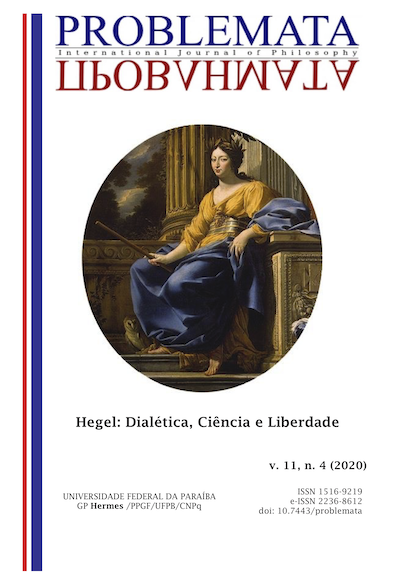THE NOTION OF SUBJECTIVITY IN THE HEGEL SYSTEM:
THE ANIMAL SUBJECTIVITY IN NATURE AND THE TRANSITION TO THE SOUL IN THE PHILOSOPHY OF SPIRIT
DOI:
https://doi.org/10.7443/problemata.v11i4.52137Keywords:
Subjectivity, Concept, Nature, Spirit, SoulAbstract
In this article, I investigate the concept of subjectivity in Hegel. First, I analyze this notion in its logical significance, as a concept and as an idea, a unity of subjectivity and objectivity. Second, I go through the significance of the concept of subjectivity also in the Philosophy of Real. Thus, I analyze subjectivity as life, in its concretization as vegetable subjectivity and as animal subjectivity in the Philosophy of Nature. Then, I problematize the question of the passage from Nature to Spirit, focusing more specifically on the issue of the emergence of the human soul - as the first aspect of the subjectivity of the spirit - based on the configuration of animal subjectivity. I argue that this passage takes place according to a movement of continuity and, from this movement, I have brief considerations about the concept of soul as the natural moment of the subjectivity of the spirit.
Downloads
References
ARISTÓTELES. De Anima. São Paulo: EDIPRO, 2011.
BOURGEOIS, B. Hegel Os atos do Espírito. São Leopoldo: Editora Unisinos, 2004.
HEGEL, G.W.F. Ciência da Lógica. 3. A Doutrina do Conceito. Petrópolis/RJ: Editora Vozes, 2018.
______. Enciclopédia das Ciências Filosóficas em Compêndio (1830). Volume II. A Filosofia da Natureza. São Paulo: Edições Loyola, 1997.
______. Enciclopédia das Ciências Filosóficas em Compêndio (1830). Volume III. A Filosofia do Espírito. São Paulo: Edições Loyola, 1995.
______. Fenomenologia do Espírito. Parte I. 5ª edição. Petrópolis: Editora Vozes, 2000.
______. Príncipes de la Philosophie du Droit ou Droit Naturel et Science de L’État en Abgrégè. 4ª edição. Paris: Libraire Philosophique J. Vrin, 1993.
PIPPIN, R. Hegel, Freedom, The Will. The Philosophy of Right: §§ 1-33. Grundlinien der Philosophie des Rechts, Berlin: Akademie Verlag, 1997.
______. Hegel’s Idealism: The Satisfactions of Self-Consciousness. 4ª edição. Cambridge University Press, 1999.
PINKARD, T. Hegel’s Naturalism: mind and nature. Oxford: Oxford USA Professio, 2012.
RAND, S. Subjetividade Animal e o Sistema Nervoso na Filosofia da Natureza de Hegel. Revista Eletrônica Estudos Hegelianos. Recife, v. 7, n. 12, jan. 2010. Disponível em < http://www.hegelbrasil.org/reh_2010_1_art2.pdf>. Acesso em: 16 fev. 2016.
SILVA, M.Z.A. Teleologia Circular: a centralidade da vida em Hegel. Revista Eletrônica Estudos Hegelianos. Recife, v. 7, n. 12, jan. 2010. Disponível em < http://www.hegelbrasil.org/reh_2010_1_art4.pdf>. Acesso em: 19 fev. 2016.
WANDSCHNEIDER, D. Formas Elementares do Psíquico: um esboço teórico-sistemático a partir da interpretação hegeliana do organismo. Revista Eletrônica Estudos Hegelianos. Recife, v. 7, n. 12, jan. 2010. Disponível em <http://www.hegelbrasil.org/reh_2010_1_art3.pdf>. Acesso em: 16 fev. 2016.
WINFIELD, R.D. Hegel and Mind. Rethinking Philosophical Psychology. Georgia: Palgrave Macmillan, 2014.
Downloads
Published
Issue
Section
License
Authors who publish with this journal agree to the following terms:
- Authors retain copyright and grant the journal right of first publication with the work simultaneously licensed under a Creative Commons Attribution License that allows others to share the work with an acknowledgement of the work's authorship and initial publication in this journal.
- Authors are able to enter into separate, additional contractual arrangements for the non-exclusive distribution of the journal's published version of the work (e.g., post it to an institutional repository or publish it in a book), with an acknowledgement of its initial publication in this journal.
-
- Authors are permitted and encouraged to post their work online (e.g., in institutional repositories or on their website) prior to and during the submission process, as it can lead to productive exchanges, as well as earlier and greater citation of published work (See The Effect of Open Access).





